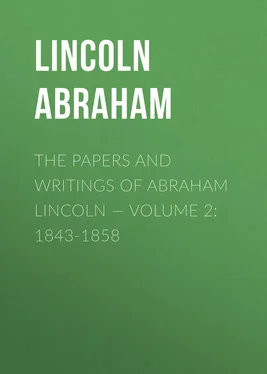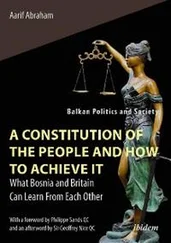Abraham Lincoln - The Papers And Writings Of Abraham Lincoln — Volume 2 - 1843-1858
Здесь есть возможность читать онлайн «Abraham Lincoln - The Papers And Writings Of Abraham Lincoln — Volume 2 - 1843-1858» — ознакомительный отрывок электронной книги совершенно бесплатно, а после прочтения отрывка купить полную версию. В некоторых случаях можно слушать аудио, скачать через торрент в формате fb2 и присутствует краткое содержание. Жанр: foreign_antique, foreign_prose, на английском языке. Описание произведения, (предисловие) а так же отзывы посетителей доступны на портале библиотеки ЛибКат.
- Название:The Papers And Writings Of Abraham Lincoln — Volume 2: 1843-1858
- Автор:
- Жанр:
- Год:неизвестен
- ISBN:нет данных
- Рейтинг книги:3 / 5. Голосов: 1
-
Избранное:Добавить в избранное
- Отзывы:
-
Ваша оценка:
- 60
- 1
- 2
- 3
- 4
- 5
The Papers And Writings Of Abraham Lincoln — Volume 2: 1843-1858: краткое содержание, описание и аннотация
Предлагаем к чтению аннотацию, описание, краткое содержание или предисловие (зависит от того, что написал сам автор книги «The Papers And Writings Of Abraham Lincoln — Volume 2: 1843-1858»). Если вы не нашли необходимую информацию о книге — напишите в комментариях, мы постараемся отыскать её.
The Papers And Writings Of Abraham Lincoln — Volume 2: 1843-1858 — читать онлайн ознакомительный отрывок
Ниже представлен текст книги, разбитый по страницам. Система сохранения места последней прочитанной страницы, позволяет с удобством читать онлайн бесплатно книгу «The Papers And Writings Of Abraham Lincoln — Volume 2: 1843-1858», без необходимости каждый раз заново искать на чём Вы остановились. Поставьте закладку, и сможете в любой момент перейти на страницу, на которой закончили чтение.
Интервал:
Закладка:
I now proceed to examine the President's evidence as applicable to such an issue. When that evidence is analyzed, it is all included in the following propositions:
(1) That the Rio Grande was the western boundary of Louisiana as we purchased it of France in 1803.
(2) That the Republic of Texas always claimed the Rio Grande as her eastern boundary.
(3) That by various acts she had claimed it on paper.
(4) That Santa Anna in his treaty with Texas recognized the Rio Grande as her boundary.
(5) That Texas before, and the United States after, annexation had exercised jurisdiction beyond the Nueces — between the two rivers.
(6) That our Congress understood the boundary of Texas to extend beyond the Nueces.
Now for each of these in its turn. His first item is that the Rio Grande was the western boundary of Louisiana, as we purchased it of France in 1803; and seeming to expect this to be disputed, he argues over the amount of nearly a page to prove it true, at the end of which he lets us know that by the treaty of 1803 we sold to Spain the whole country from the Rio Grande eastward to the Sabine. Now, admitting for the present that the Rio Grande was the boundary of Louisiana, what under heaven had that to do with the present boundary between us and Mexico? How, Mr. Chairman, the line that once divided your land from mine can still be the boundary between us after I have sold my land to you is to me beyond all comprehension. And how any man, with an honest purpose only of proving the truth, could ever have thought of introducing such a fact to prove such an issue is equally incomprehensible. His next piece of evidence is that "the Republic of Texas always claimed this river [Rio Grande] as her western boundary." That is not true, in fact. Texas has claimed it, but she has not always claimed it. There is at least one distinguished exception. Her State constitution the republic's most solemn and well-considered act, that which may, without impropriety, be called her last will and testament, revoking all others-makes no such claim. But suppose she had always claimed it. Has not Mexico always claimed the contrary? So that there is but claim against claim, leaving nothing proved until we get back of the claims and find which has the better foundation. Though not in the order in which the President presents his evidence, I now consider that class of his statements which are in substance nothing more than that Texas has, by various acts of her Convention and Congress, claimed the Rio Grande as her boundary, on paper. I mean here what he says about the fixing of the Rio Grande as her boundary in her old constitution (not her State constitution), about forming Congressional districts, counties, etc. Now all of this is but naked claim; and what I have already said about claims is strictly applicable to this. If I should claim your land by word of mouth, that certainly would not make it mine; and if I were to claim it by a deed which I had made myself, and with which you had had nothing to do, the claim would be quite the same in substance — or rather, in utter nothingness. I next consider the President's statement that Santa Anna in his treaty with Texas recognized the Rio Grande as the western boundary of Texas. Besides the position so often taken, that Santa Anna while a prisoner of war, a captive, could not bind Mexico by a treaty, which I deem conclusive — besides this, I wish to say something in relation to this treaty, so called by the President, with Santa Anna. If any man would like to be amused by a sight of that little thing which the President calls by that big name, he can have it by turning to Niles's Register, vol. 1, p. 336. And if any one should suppose that Niles's Register is a curious repository of so mighty a document as a solemn treaty between nations, I can only say that I learned to a tolerable degree of certainty, by inquiry at the State Department, that the President himself never saw it anywhere else. By the way, I believe I should not err if I were to declare that during the first ten years of the existence of that document it was never by anybody called a treaty — that it was never so called till the President, in his extremity, attempted by so calling it to wring something from it in justification of himself in connection with the Mexican War. It has none of the distinguishing features of a treaty. It does not call itself a treaty. Santa Anna does not therein assume to bind Mexico; he assumes only to act as the President — Commander-in-Chief of the Mexican army and navy; stipulates that the then present hostilities should cease, and that he would not himself take up arms, nor influence the Mexican people to take up arms, against Texas during the existence of the war of independence. He did not recognize the independence of Texas; he did not assume to put an end to the war, but clearly indicated his expectation of its continuance; he did not say one word about boundary, and, most probably, never thought of it. It is stipulated therein that the Mexican forces should evacuate the territory of Texas, passing to the other side of the Rio Grande; and in another article it is stipulated that, to prevent collisions between the armies, the Texas army should not approach nearer than within five leagues — of what is not said, but clearly, from the object stated, it is of the Rio Grande. Now, if this is a treaty recognizing the Rio Grande as the boundary of Texas, it contains the singular feature of stipulating that Texas shall not go within five leagues of her own boundary.
Next comes the evidence of Texas before annexation, and the United States afterwards, exercising jurisdiction beyond the Nueces and between the two rivers. This actual exercise of jurisdiction is the very class or quality of evidence we want. It is excellent so far as it goes; but does it go far enough? He tells us it went beyond the Nueces, but he does not tell us it went to the Rio Grande. He tells us jurisdiction was exercised between the two rivers, but he does not tell us it was exercised over all the territory between them. Some simple-minded people think it is possible to cross one river and go beyond it without going all the way to the next, that jurisdiction may be exercised between two rivers without covering all the country between them. I know a man, not very unlike myself, who exercises jurisdiction over a piece of land between the Wabash and the Mississippi; and yet so far is this from being all there is between those rivers that it is just one hundred and fifty-two feet long by fifty feet wide, and no part of it much within a hundred miles of either. He has a neighbor between him and the Mississippi — that is, just across the street, in that direction — whom I am sure he could neither persuade nor force to give up his habitation; but which nevertheless he could certainly annex, if it were to be done by merely standing on his own side of the street and claiming it, or even sitting down and writing a deed for it.
But next the President tells us the Congress of the United States understood the State of Texas they admitted into the Union to extend beyond the Nueces. Well, I suppose they did. I certainly so understood it. But how far beyond? That Congress did not understand it to extend clear to the Rio Grande is quite certain, by the fact of their joint resolutions for admission expressly leaving all questions of boundary to future adjustment. And it may be added that Texas herself is proven to have had the same understanding of it that our Congress had, by the fact of the exact conformity of her new constitution to those resolutions.
I am now through the whole of the President's evidence; and it is a singular fact that if any one should declare the President sent the army into the midst of a settlement of Mexican people who had never submitted, by consent or by force, to the authority of Texas or of the United States, and that there and thereby the first blood of the war was shed, there is not one word in all the which would either admit or deny the declaration. This strange omission it does seem to me could not have occurred but by design. My way of living leads me to be about the courts of justice; and there I have sometimes seen a good lawyer, struggling for his client's neck in a desperate case, employing every artifice to work round, befog, and cover up with many words some point arising in the case which he dared not admit and yet could not deny. Party bias may help to make it appear so, but with all the allowance I can make for such bias, it still does appear to me that just such, and from just such necessity, is the President's struggle in this case.
Читать дальшеИнтервал:
Закладка:
Похожие книги на «The Papers And Writings Of Abraham Lincoln — Volume 2: 1843-1858»
Представляем Вашему вниманию похожие книги на «The Papers And Writings Of Abraham Lincoln — Volume 2: 1843-1858» списком для выбора. Мы отобрали схожую по названию и смыслу литературу в надежде предоставить читателям больше вариантов отыскать новые, интересные, ещё непрочитанные произведения.
Обсуждение, отзывы о книге «The Papers And Writings Of Abraham Lincoln — Volume 2: 1843-1858» и просто собственные мнения читателей. Оставьте ваши комментарии, напишите, что Вы думаете о произведении, его смысле или главных героях. Укажите что конкретно понравилось, а что нет, и почему Вы так считаете.












